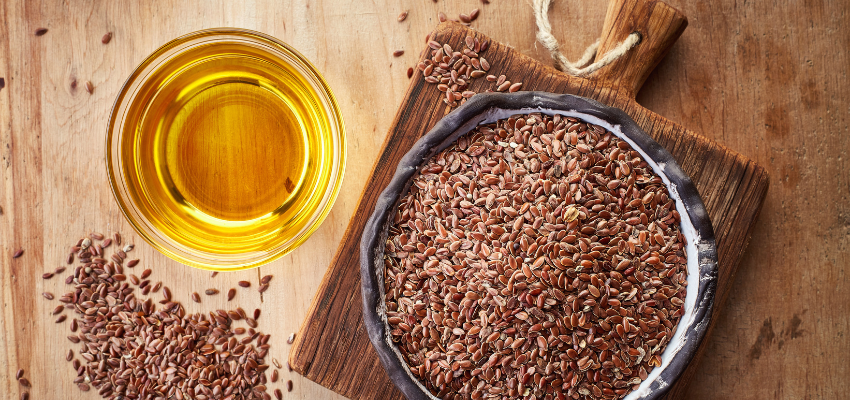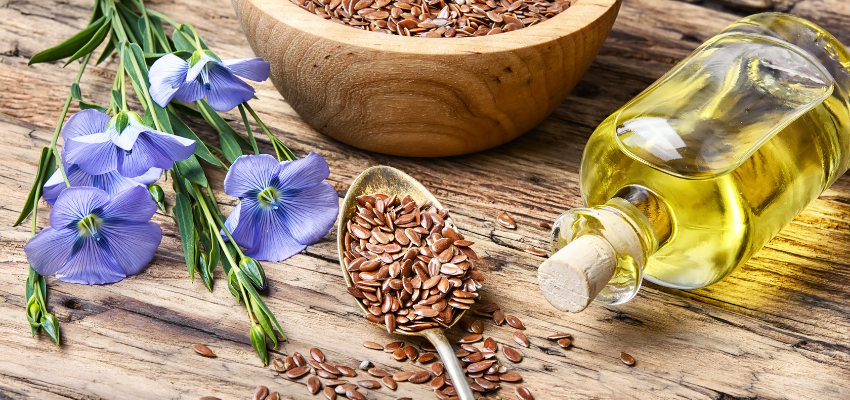Flaxseed oil is probably the most commonly used oil for horses. But what makes this oil so popular? In this article, you’ll learn everything you need to know about flaxseed oil for horses, from its effects, to the proper application and dosage, and even possible side effects. Enjoy reading!
What is flaxseed oil?
Flaxseed oil is pressed from the seeds of the flax plant. It is particularly rich in unsaturated fatty acids like Omega-3 and Omega-6. Omega-3 fatty acids are considered essential fatty acids, meaning they must be taken in through the diet since the body cannot produce them on its own. In addition to Omega-3 and Omega-6 fatty acids, flaxseed oil also contains Vitamin E and other essential nutrients and is protein-free.

How does flaxseed oil affect horses?
Flaxseed oil offers numerous health benefits for your horse and can support overall health:
- Improvement of Skin & Coat: Flaxseed oil is a rich source of omega-3 fatty acids. They contribute to the health of your horse’s skin and coat. They promote the formation of a healthy skin barrier, can reduce dry, flaky skin and itching, and give a shiny coat.
- Joint Health: The Omega-3 fatty acids in flaxseed oil have anti-inflammatory effects and can contribute to joint health, alleviating joint discomfort.
- Strengthening the Immune System: Nutrients in flaxseed oil, such as Vitamin E, have antioxidant properties. This can support your horse’s immune system and bolster its defenses.
- Supporting Metabolism: Oil is essential for many metabolic processes in your horse’s body. Thus, flaxseed oil can positively impact metabolism.
- Energy Supplier: Flaxseed oil has a high energy content. Additionally, it is free from proteins and carbohydrates, making it easily digestible. It is often fed as an energy source for performance horses, those with metabolic muscle diseases such as PSSM, or hard-to-feed horses.
How much flaxseed oil should I feed my horse?
The optimal dosage of flaxseed oil depends on your horse’s weight. 10 ml of flaxseed oil per 100 kg (220 lbs) of body weight per day is a general guideline for feeding horses. So, for a large horse weighing 500 kg (1100 lbs), a daily amount of 50 ml of flaxseed oil is a healthy addition.
When you start feeding flaxseed oil, you should begin with a low dosage and gradually increase it. This allows your horse’s gastrointestinal tract to slowly adjust to the oil and can help prevent side effects.

How should I feed flaxseed oil to my horse?
Administering flaxseed oil to horses is simple. You can either drizzle the oil directly over your horse’s food or mix it in with treats.
What should I look for when buying flaxseed oil for horses?
The quality of the flaxseed oil is crucial to reap the best possible health benefits for your horse. A high-quality product should meet the following criteria:
Processing & Extraction
The method of processing and extraction of flaxseed oil can greatly influence its quality. Cold-pressed flaxseed oil for horses is recommended since it’s extracted at low temperatures without the use of chemicals. This process helps preserve the delicate Omega-3 and Omega-6 fatty acids and other nutrients, preventing oxidation.
Shelf Life & Freshness
High-quality flaxseed oil for horses should be packaged in an airtight and opaque container. This keeps the oil fresh and maintains its efficacy. The shelf life of flaxseed oil varies among manufacturers. Pay attention to the expiration date and store the oil in a cool, dark place.
Possible side effects of flaxseed oil for horses
Flaxseed oil is generally well-tolerated. However, some horses might experience side effects:
- Digestive disorders: An excessive dosage of flaxseed oil can lead to digestive issues, such as diarrhea in horses. Therefore, it’s important to start with a low dosage and gradually increase it. This allows your horse’s digestive system to slowly adjust to the oil, minimizing side effects.
- Weight gain: Since flaxseed oil, like any other oil, is calorie-dense, feeding too much can lead to weight gain over time. Be mindful of the appropriate dosage and adjust if necessary.
Is flaxseed oil harmful to horses?
The flaxseeds contained in the oil have cyanogenic glycosides, secondary plant compounds that release cyanide during digestion. Cyanide is toxic to almost all animals. This is why some horse owners have reservations about feeding flaxseed oil. Although flaxseed oil contains a relatively high amount of cyanide, the risk of poisoning your horse is minimal if you adhere to the manufacturer’s feeding guidelines and only give the oil in moderation.

Alternatives to flaxseed oil for horses
There are several alternative oils that offer similar health benefits:
Black seed oil
Black seed oil is derived from black cumin seeds. The oil also provides valuable unsaturated fatty acids, vitamins, and minerals. It is known for its antioxidant, antimicrobial, and anti-inflammatory properties. Unlike flaxseed oil, black seed oil is composed of different fatty acids and contains essential oils.
Hemp oil
Hemp oil is pressed from hemp seeds. It’s also rich in unsaturated Omega-3 and Omega-6 fatty acids. It can support skin and coat, the immune system, and overall well-being. Compared to flaxseed oil, hemp oil has a higher content of gamma-linolenic acid (GLA), an Omega-6 fatty acid with anti-inflammatory properties.
Fish oil
Fish oil is an excellent source of Omega-3 fatty acids, especially eicosapentaenoic acid (EPA) and docosahexaenoic acid (DHA). These can benefit your horse’s skin and coat, joints, immune system, and cardiovascular health. Unlike flaxseed oil, fish oil provides directly usable Omega-3 fatty acids, while flaxseed oil provides the precursor alpha-linolenic acid (ALA). Your horse’s body needs to convert ALA to EPA and DHA.
Our conclusion
Flaxseed oil for horses is a valuable dietary supplement that offers numerous health benefits. Pay attention to the quality of the oil and the correct dosage to best support your horse.








